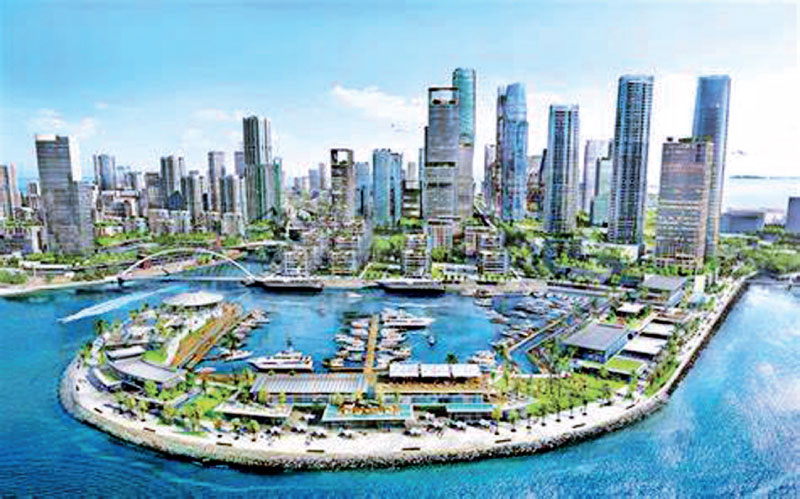Sunday Feb 22, 2026
Sunday Feb 22, 2026
Monday, 21 April 2025 00:26 - - {{hitsCtrl.values.hits}}

The tax holidays granted to projects such as the Colombo Port City have become largely irrelevant and ineffective
 The global minimum corporate tax rate was one of the reasons cited by both governments of Ranil Wickramasinghe and NPP to impose the tax of 15% on digital service income and others. At the outset, it must be stated that both governments appear to have misunderstood or misrepresented the concept of the global minimum corporate tax.
The global minimum corporate tax rate was one of the reasons cited by both governments of Ranil Wickramasinghe and NPP to impose the tax of 15% on digital service income and others. At the outset, it must be stated that both governments appear to have misunderstood or misrepresented the concept of the global minimum corporate tax.
The 15% global minimum corporate tax is an initiative taken by the Inclusive Framework of the Organization for Economic Cooperation and Development (OECD), agreed upon by over 140 countries in 2021, and effective from 2024. It aims to ensure that large multinational companies (MNCs)—with consolidated annual revenue of at least EUR 750 million—pay a minimum level of tax regardless of where they operate or reside.
A MNC is a business entity that operates and controls its supply of goods or services in more than one country through subsidiaries, branches, or affiliates, while typically maintaining a central headquarter in its home country, as Ultimate Parent Entity (UTP).
Under this framework of global minimum tax, if an MNC’s subsidiary pays less than the 15% effective tax rate in one country, other jurisdictions where the MNC operates can apply a top-up tax to make up the difference under the GloBE rules.
It is therefore clear that this 15% minimum tax does not apply to local businesses or individuals, but only to MNCs above the specified revenue threshold. Using this framework as justification for imposition of tax on digital services or local companies is misleading and not aligned with the intent or scope of the OECD’s initiative.
Objective of global minimum corporate tax
The declared objective of this minimum tax rate is to prevent the tax base erosion and to stop the “race to bottom” which refers to a trend where countries compete with each other, especially developing countries to offer the lowest corporate tax rates to attract multinational companies of the developed countries to invest or shift profits there.
Suppose a particular country lowers its corporate tax rate to 10% to attract MNCs. Neighboring countries might respond by cutting their own rates to 8% or even 5% to stay competitive. Eventually, tax rates become so low that governments can’t raise enough revenue, and companies pay very little tax despite making large profits globally. This unhealthy competition leads to double non-taxation, Base Erosion and Profit Shifting (BEPS) and creation of tax heavens.
The undeclared objective of this framework – as per my understanding – is to prevent capital outflow from the developed countries and to enrich them further by charging taxes from such MNCs in the name of GloBE rules under “Pillar Two” in contrast to hitherto globally recognised “Residency” and “Source” taxation principles.
GloBE rule under “Pillar Two” and how it differs from international taxation principles
Source Rule means that a country taxes income based on where it is earned. For an example, a Sri Lankan resident derives rental income from a building let in UK and UK taxes his rental income as it was generated therefrom regardless of his residency.
Residency rule means that a country taxes its residents on their local and worldwide income on the basis that they are residents of that particular country, regardless of where the income is earned.
For example, if a Sri Lankan resident earns rental income from the UK, both Sri Lanka (by residence) and the UK (by source) may tax the same income. This is called “Double Taxation” as one income is subject to tax twice in Sri Lanka and UK on the basis of residency and source principles, respectively.
In such instance, Double Tax Avoidance Agreement (DTAA) between the two countries plays a role of mitigating the adverse effects of double taxation by way of either granting “foreign tax credits” or exemption/exclusion to the foreign sourced income.
This is the international taxation principle hitherto followed by all the countries with only one exception of USA, which taxes its citizens on their worldwide income, regardless of where they reside or earn it — even if they are not US residents.
It is to be noted that Residency is different from Citizenship. Residency of an individual is determined by his/her physical presence in aggregate of 183 days or more in a country during a year. Thus, a Sri Lankan citizen can be a resident of UK and vice versa.
GloBE Rule of Pillar Two
The GloBE rules under Pillar Two introduce a new concept: large MNCs must pay a minimum effective tax rate of 15% in every jurisdiction. If not, the Ultimate Parent Entity’s country may apply the Income Inclusion Rule (IIR) to collect the shortfall. If the IIR isn’t applied, other countries can step in via the Undertaxed Profits Rule (UTPR).
This is a departure from traditional source and residence taxation principles and allows countries to tax foreign income on the basis that it was undertaxed elsewhere, regardless of where it was actually earned or where the company is resident.
Sri Lanka a member of OECD Inclusive Framework
Sri Lanka became a member of the OECD Inclusive Framework in 2018. However, in 2021, Sri Lanka took a bold and principled decision not to agree to the too ambitious Pillar One and Pillar Two proposal, under which GloBE rule falls. Countries were given less than a month to express their consent—an unreasonably short time for such complex and far-reaching reforms. Out of more than 140 countries, Sri Lanka was one of three that chose not to endorse the agreement at that time.
Today, more than 60 countries, under the guidance of the UN Tax Committee and the South Centre, have echoed similar concerns—questioning the fairness, practicality, and equity of the Pillar One and Pillar Two package.
Sri Lanka’s key reason for not supporting Pillar Two’s GloBE rules is rooted in the realities faced by developing nations. For countries like Sri Lanka, Foreign Direct Investment (FDI) is far more critical than marginal increases in tax revenue. Moreover, the ability to determine how and whether to tax resident companies, and to set domestic tax rates, is an inalienable right of sovereign nations.
Any attempt by the OECD—largely composed of developed nations—to override these sovereign decisions through the imposition of a global minimum tax, under the guise of a “consensus,” represents a serious overreach. It is not only unilateral and self-serving, but also immoral and unethical in its disregard for the developmental needs and policy space of less powerful countries.
How OECD enforces GloBE rule of minimum corporate tax of 15% on MNCs
GloBE rule ensures that every member of MNCs should pay the minimum tax of 15% at every country it operates through its two fundamental rules. They are Income Inclusion Rule (IIR) and Undertaxed Profit Rule (UTPR)
 It is imperative that Presidential advisors and economic policymakers urgently assess the changing global tax landscape and develop strategies to mitigate the adverse implications of Pillar Two. This includes identifying alternative, non-tax incentives that can more effectively attract and retain FDI, which remains critical to Sri Lanka’s economic recovery and long-term development
It is imperative that Presidential advisors and economic policymakers urgently assess the changing global tax landscape and develop strategies to mitigate the adverse implications of Pillar Two. This includes identifying alternative, non-tax incentives that can more effectively attract and retain FDI, which remains critical to Sri Lanka’s economic recovery and long-term development
Income Inclusion Rule (IIR)
IIR is the primary rule in Pillar Two of the OECD. Income Inclusion Rule requires Ultimate Parent Entity (UPE) of a MNC to pay top-up tax if any of its subsidiaries had paid the income tax on its profits derived from any country it operates below the 15% minimum effective tax rate. (Top-up tax is the difference between the minimum effective tax rate (15%) and the actual tax paid on profits in a given jurisdiction)
Example: If a Sri Lankan subsidiary pays 5% tax, and its UPE is in the UK, the UK collects the 10% top-up tax from its UPE on behalf of its Sri Lankan subsidiary company. Thus, the tax concession given to the subsidiary, eventually benefits the UK tax authority, where its UPE is headquartered.
Undertaxed Profit Rule (UTPR)
UTPR acts as a backstop to the IIR. It means that if the parent country of UPE does not apply the IIR and collect the top-up tax of its subsidiary, UTPR allows other countries wherein the subsidiaries operate, to step in and collect the shortfall from other subsidiaries of the MNC.
For an example as stated above, the MNC has another subsidiary in addition to Sri Lankan one, in India and UK tax authority, where the UPE of MNC is situated, has not applied the IIR. Hence, UTPR allows Indian tax authority to collect the top-up tax from the Indian subsidiary by making necessary adjustments in its profit and loss accounts.
Options for Sri Lanka, given its tax holidays in places like Colombo Port City
As explained above, Sri Lanka’s agreement or non-agreement to the GloBE rules under Pillar Two will not shield the country from its adverse consequences. Regardless of Sri Lanka’s position, any corporate tax concession below the 15% minimum effective rate will fail to incentivise foreign investment, as the intended tax incentives meant to the foreign investors are effectively grabbed by foreign tax authorities under the mechanisms of Income Inclusion Rule (IIR) and Undertaxed Profits Rule (UTPR).
In this context, the tax holidays granted to projects such as the Colombo Port City have become largely irrelevant and ineffective. These concessions, once considered a key strategy to attract Foreign Direct Investment (FDI), no longer deliver the intended competitive advantage. Instead, they simply shift the tax benefit away from the investor and surrender it to other tax jurisdictions where the MNCs operate.
The way out is DMTT
In addition to rethinking tax-related incentives in the Colombo Port City and other Export Processing Zones, Sri Lanka must consider adopting a Domestic Minimum Top-up Tax (DMTT). This mechanism would allow the government to collect the top-up tax locally, thereby preventing foreign jurisdictions from claiming taxing rights on profits generated within Sri Lanka under IIR or UTPR.
To be effective, this would require amending local tax legislation to impose a minimum effective tax rate of 15% on applicable MNCs. Once implemented, no other country would have the authority to impose additional tax on those profits, as the income would already be deemed to have met the global minimum tax threshold.
If designed in accordance with OECD guidelines, this mechanism would qualify as a “Qualified Domestic Minimum Top-up Tax (QDMTT)”, ensuring recognition and compliance by other jurisdictions under the GloBE framework.
It is therefore imperative that Presidential advisors and economic policymakers urgently assess the changing global tax landscape and develop strategies to mitigate the adverse implications of Pillar Two. This includes identifying alternative, non-tax incentives that can more effectively attract and retain FDI, which remains critical to Sri Lanka’s economic recovery and long-term development.
(The writer is a retired Deputy Commissioner General, Inland Revenue Department. He can be contacted via [email protected].)